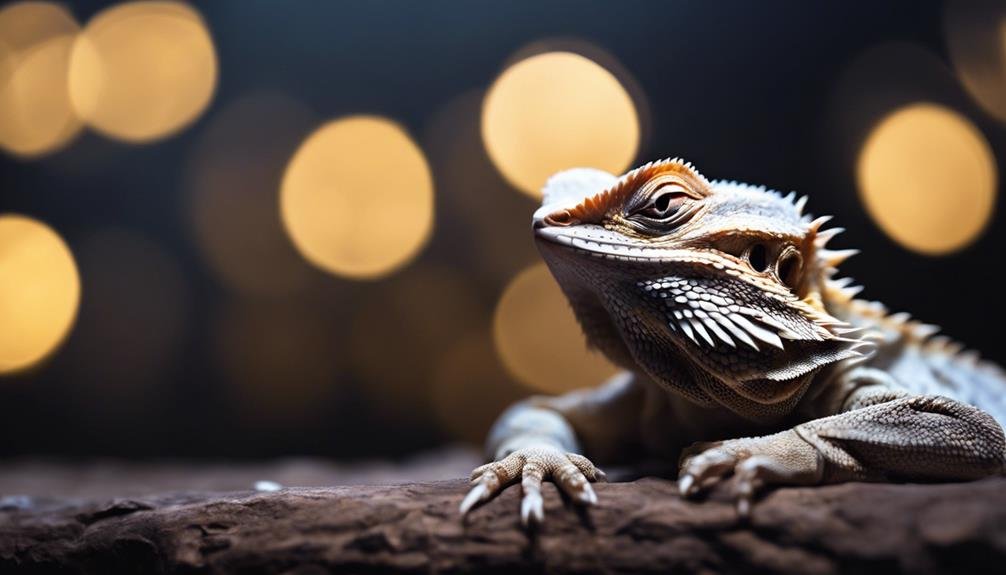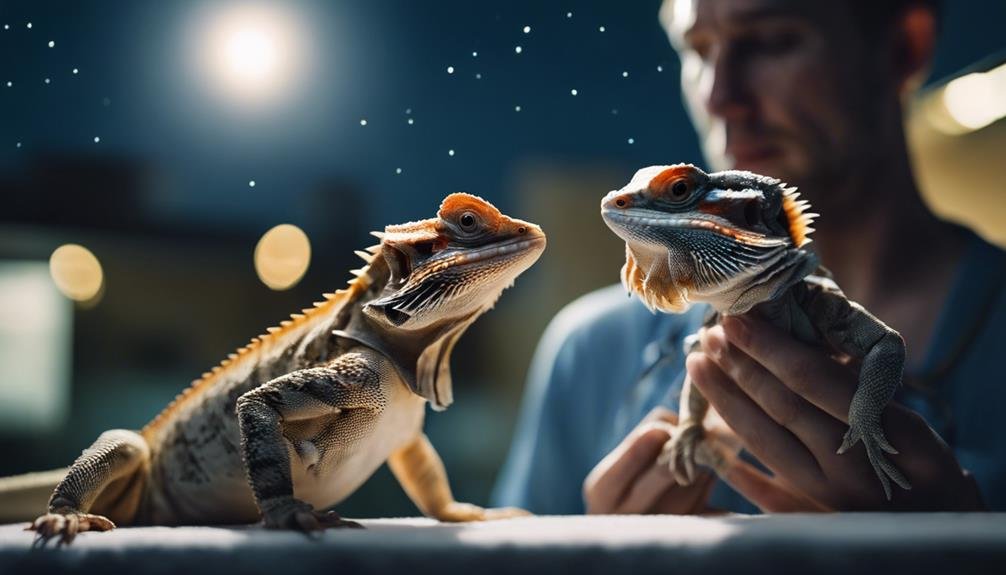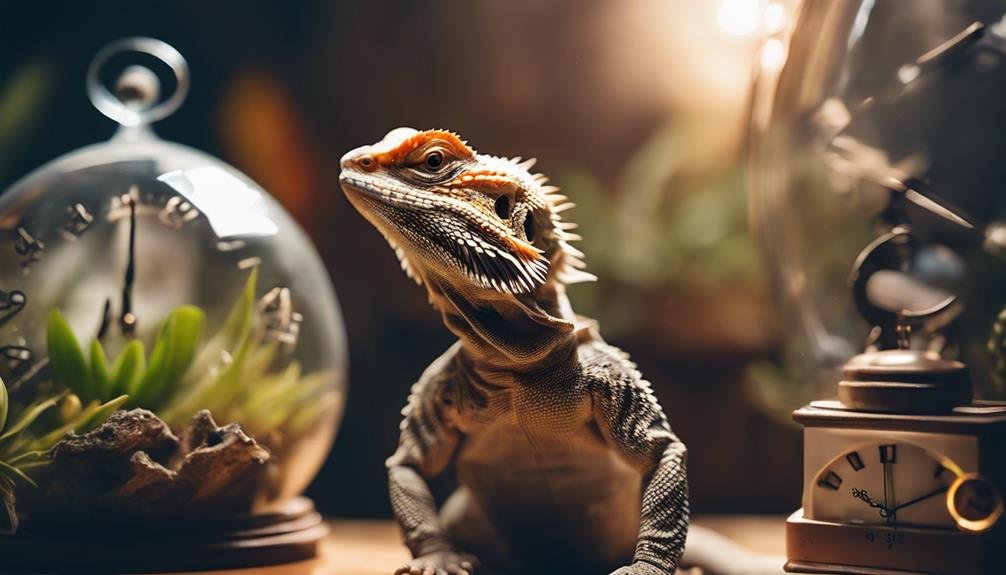You might think your bearded dragon‘s schedule is straightforward—wake up with the sun, sleep after dusk, right? However, if you’ve noticed your scaly friend dozing off at odd hours or showing a pattern that doesn’t quite fit the diurnal bill, you’re not alone. Various factors, from the temperature in their habitat to potential health concerns, can throw a wrench into what should be a predictable day-night cycle. As you’re about to discover, these irregularities are not just quirks but could be signals of something more. Stick around to uncover what these sleep patterns mean and when it’s time to worry.
Key Takeaways
- Bearded dragons are diurnal reptiles, active during daylight and sleep at night.
- Irregular sleeping patterns may signal environmental stress or health issues.
- Inadequate lighting and improper temperatures can disrupt their natural sleep cycle.
- Excessive sleepiness or lethargy could indicate illnesses like metabolic bone disease or respiratory infections.
- Regular veterinary check-ups are recommended to address sleep disturbances and underlying health problems.
Understanding Bearded Dragon Sleep
To properly care for your bearded dragon, it’s important to understand their need for specific sleep patterns, which play an essential role in their health and well-being. Like you, bearded dragons experience REM and slow-wave sleep, important for their cognitive functions and overall health. These sleep stages, common in mammals and birds, indicate that your bearded dragon’s sleep is more complex than merely closing their eyes. During REM sleep, they process the day’s learning and experiences, while slow-wave sleep helps with physical restoration.
Ensuring your bearded dragon gets enough quality sleep also plays a proactive role in monitoring their health. Changes in sleep patterns can be early signs of illness or stress, requiring your attentive care. As diurnal reptiles, bearded dragons are active during the day and rest at night, mimicking natural sunlight patterns for optimal health.
Common Causes of Irregular Sleep
Understanding the common causes of irregular sleep in bearded dragons can help you better care for your pet. One of the primary reasons for these disturbances is environmental factors, such as inadequate lighting or improper temperatures. Your bearded dragon relies on a precise setup to mimic its natural habitat, and any deviation can lead to discomfort and sleep issues.
Health issues also play a significant role in disrupting your bearded dragon’s sleep. Conditions like metabolic bone disease, respiratory infections, and parasites can all cause discomfort, leading to irregular sleep patterns. Monitoring for any signs of these illnesses and consulting a vet if you suspect your pet is affected is crucial.
Stress shouldn’t be underestimated either. Changes in their environment, handling, or even interactions with tank mates can make your bearded dragon feel threatened or uncomfortable, affecting its sleep. Additionally, natural processes such as shedding, brumation, and age-related changes can alter sleep patterns.
Identifying Illness Symptoms


Recognizing the symptoms of illness in your bearded dragon, such as mouth rot, dehydration, and digestive issues, is essential for their well-being. When your bearded dragon exhibits irregular sleeping patterns, it could be a sign of underlying health problems. It’s important to be vigilant and note any symptoms that deviate from their normal behavior.
Here are key signs to watch for:
- Mouth Rot: Look for excessive saliva or bleeding gums, which are clear indicators of this painful condition.
- Dehydration: Sunken eyes and lethargy can signal dehydration, a common issue that can impact their sleep.
- Digestive Blockages: If your bearded dragon is showing a lack of appetite or is unable to defecate, digestive blockages could be the culprit.
- Respiratory Issues and Metabolic Bone Disease: Wheezing, difficulty breathing, or a rubbery jaw can indicate serious health issues that affect their overall vitality and sleep patterns.
Illnesses like metabolic bone disease, respiratory issues, and parasitic infections not only cause lethargy and sleepiness but can also lead to more severe health problems if not addressed. Regular veterinary check-ups, ensuring proper hydration, and providing balanced nutrition are crucial steps in preventing these issues and maintaining the health of your bearded dragon.
Monitoring and Improving Sleep Habits
After noting any irregular behaviors or symptoms in your bearded dragon, it’s important to focus on monitoring and enhancing their sleep habits to safeguard their health and well-being. Excessive sleepiness, like lethargy and closed eyes, might hint at brumation or more serious health issues. Make sure your dragon responds to stimuli, basks properly, and exhibits overall alertness.
To make this process more relatable, here’s a simple table outlining key factors and actions to monitor and improve your bearded dragon’s sleep patterns:
| Factor | Sign to Monitor | Action to Take |
|---|---|---|
| Environmental Factors | Inadequate UVB lighting | Adjust lighting and temperature |
| Response to Stimuli | Reduced activity, lethargy | Ensure proper hydration |
| Sleep Patterns | Excessive sleepiness | Check for signs of brumation |
| Health | Unusual sleep behavior | Schedule regular vet check-ups |
Monitoring these aspects closely helps prevent health problems related to irregular sleep patterns. Remember, environmental factors like UVB lighting and temperature gradients are key in maintaining healthy sleep habits. If you’re ever in doubt, seeking veterinary attention is an important step to ensure your bearded dragon’s well-being.
Seeking Veterinary Care


When your bearded dragon shows signs of irregular sleeping patterns, it’s important to seek veterinary care to address potential health issues. Noticing changes in how your bearded dragon sleeps can be the first step in recognizing that something isn’t right. Irregular sleeping patterns can indicate underlying health conditions that require professional veterinary care.
Veterinarians specializing in reptiles can offer invaluable support in diagnosing and treating any sleep-related issues your bearded dragon might be facing. Additionally, they can provide guidance on husbandry practices to ensure your pet’s environment is conducive to a healthy sleep cycle. Don’t wait until the problem escalates; timely veterinary intervention is key to maintaining your bearded dragon’s health and well-being.
To engage you further, here are key points to remember:
- Seek a reptile specialist for accurate diagnosis and treatment.
- Regular check-ups can prevent sleep-related issues from worsening.
- Proper husbandry practices are essential for your bearded dragon’s overall health.
- Timely intervention can greatly impact the outcome of sleep and health conditions.
Ensuring your bearded dragon receives the right veterinary care is essential in managing any irregular sleeping patterns and underlying health issues.
Can Playing Music Affect a Bearded Dragon’s Nocturnal Behavior and Health?
Playing music can have positive effects on bearded dragons, influencing their nocturnal behavior and overall health. Certain types of music can help reduce stress and promote relaxation, creating a more comfortable environment for these reptiles. It’s worth considering the impact of music on their well-being.
Frequently Asked Questions
What Are the Common Illnesses of a Bearded Dragon?
Your bearded dragon might face several common illnesses, including Metabolic Bone Disease, Respiratory Infections, and Digestive Blockages. They’re also prone to Fungal Infections, Parasitic Infestations, and Vitamin Deficiencies.
Don’t overlook Thermal Burns, Dehydration Concerns, Mouth Rot, and various Skin Conditions. These issues can seriously impact their health, so it’s essential to keep an eye out for symptoms and seek veterinary care when you spot anything unusual to keep your scaly friend healthy.
Is My Bearded Dragon Brumation or Sick?
You’re wondering if your bearded dragon’s behavior indicates brumation or sickness. Look for brumation signs like reduced activity, diet changes, and seeking shelter. Temperature, light cycles, and habitat setup greatly impact this. Make sure they’re hydrated.
Age and stress, shown through handling frequency, also play roles. If their behavior deviates considerably or concerns you, consulting a vet is wise. Understanding these factors helps differentiate between natural dormancy and potential illness.
What Are Signs of Neurological Issues in Bearded Dragons?
If your bearded dragon is displaying head tilting, circling behavior, or seizure episodes, they might be facing neurological issues. Watch out for limb paralysis, unsteady movements, and twitching muscles.
Irregular feeding habits, sudden aggression, eye problems, and balance issues are also red flags. These symptoms don’t just appear. They signal something’s off with their health, requiring immediate attention.
Don’t wait; consulting a vet can help pinpoint the problem and get your dragon the care they need.
What Is the Wasting Disease in Bearded Dragons?
Wasting disease in bearded dragons isn’t about metabolic bone disease or nutritional deficiencies; it’s a viral infection hitting their organs hard. You’ll see weight loss, lethargy, and appetite loss, different from issues like parasitic infections or digestive blockages.
It doesn’t stem from poor UVB lighting or hydration issues but requires keen hygiene to prevent. Unlike respiratory infections or shedding problems, there’s no direct treatment, making crucial care essential.
Always quarantine new pets and watch for symptoms.
Conclusion
To summarize, you’ve learned that bearded dragons aren’t nocturnal but can have irregular sleep patterns due to various factors. It’s crucial to keep an eye on their sleep habits, as changes can signal health issues.
By providing the right care and environment, you can help guarantee your bearded dragon’s sleep patterns remain healthy. If you notice any concerning symptoms, don’t hesitate to seek veterinary care. Remember, your attention to their sleep can greatly impact their overall well-being.


